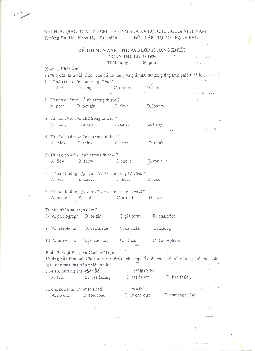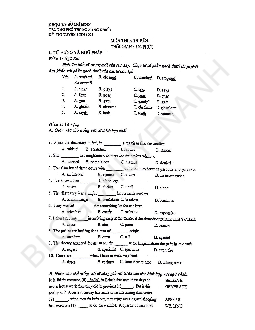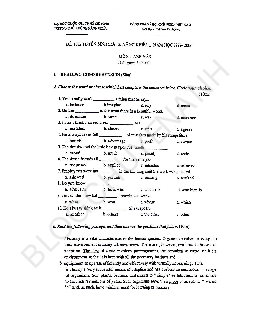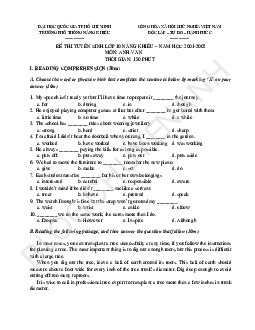




Preview text:
SỞ NAM ĐỊNH
PART A. LANGUAGE FOCUS (4,0 điểm)
I. Khoanh tròn một phương án A, B, C hoặc D ứng với từ có phần gạch chân phát âm
khác các từ còn lại trong câu sau như ví dụ (câu 0) đã làm. (0,6 điểm) 0. A. what B. where C. who D. when A. wɑːt B. wer C. huː D. wen 1. A. resolved B. destroyed C. occurred D. existed A.rɪˈzɑːlvd B. dɪˈstrɔɪd C. əˈkɝːrd D. ɪɡˈzɪstɪd 2. A. paper B. basic C. band D. pay A.peɪpɚr B. ˈbeɪsɪk C. bænd D. peɪ 3. A. happy B. hour C. high D. hotel A.ˈhæpi B. aʊr C. haɪ D. hoʊˈtel
II. Khoanh tròn một phương án A, B, C hoặc D ứng với từ có trọng âm chính rơi vào vị trí
âm tiết khác các từ còn lại như ví dụ (câu 0) đã làm. (0,4 điểm) 0. A. mother B. brother C. advice D. beauty A.ˈmʌðɚr B. brʌðɚr C. ədˈvaɪs D.ˈbjuːt̬i 1. A. compare B. impress C. happen D. extend A. kəmˈper B. ɪmˈpres C. ˈhæpən D. ɪkˈstend 2. A. intention B. energy C. position D. musician A. ɪnˈtenʃən B. ˈenɚrdʒi C. pəˈzɪʃən D. mjuːˈzɪʃən
III. Khoanh tròn một phương án A, B, C hoặc D ứng với từ hoặc cụm từ thích hợp để điền
vào mỗi chỗ trống trong các câu sau như ví dụ (câu 0) đã làm. (2,0 điểm)
0. Nam ________ here three weeks ago. A. has been B. will be ©. was D. is
1. Your mother is cooking in the kitchen, ______ ? A. isn’t she B. doesn’t she C. won’t she D. is she ●
Cấu trúc câu hỏi đuôi: đông từ chính “is cooking” --> isn’t she
2. He worked ______ than his classmates. A. more carefully B. as carefully C. most carefully D. the most carefully ● Công thức so sánh hơn: ●
Nếu từ chỉ có 1 âm tiết: ADJ/ADV + đuôi -er + than ●
Nếu từ có 2 âm tiết trở lên: more + ADJ/ADV + than
3. Nam is a very ______ student. He takes part in all activities organized in our school. A. empathetic B. creative C. impatient D. dynamic ●
Empathetic /¸empə´θetik/ (a): Có sự đồng cảm, thông cảm ●
Creative /kri´eitiv/ (a): Sáng tạo ●
Impatient /ɪm'peɪʃnt/ (a): Thiếu kiên nhẫn, không kiên tâm, nóng vội, nôn nóng; hay sốt ruột ●
Dynamic /daɪˈnæmɪk/ (a): Năng động, năng nổ, sôi nổi
4. New ______ about the COVID-19 will be updated on the Internet every minute. A. inform B. information C. informed D. informative ●
Information ,infə'meinʃn/ (n): Tin tức, tài liệu; kiến thức ●
Informative /in´fɔ:mətiv/ (a): Có tác dụng nâng cao kiến thức ●
Inform /in'fo:m/ (v): Báo tin cho; cho biết
5. Children should play sports ______ it helps in creating a healthier generation. A. in spite of B. because of C. because D. although ●
In spite of noun = although + clause: mặc dù ●
Because + clause = because of + noun: bởi vì
6. If you're not sure what a new word means, ______ in your dictionary or use your electronic dictionary for help. A. look for B. look after C. look at D. look up ●
Look for (phr verb): tìm kiếm ●
Look after (phr verb): chăm sóc ●
Look up (phr verb):tra cứu (từ điển, số điện thoại)
7. She was ______ first student to come to class this morning. A. a B. an C. Ø (no article) D. the ●
“the” đứng trước tính từ so sánh nhất
8. She ______ a living by selling vegetables in the village market. A. earns B. does C. works D. takes ●
Earn a living (idm): Gắng kiếm sống
9. Our source of fossil fuels such as coal or oil will soon come to an end if we don’t ______ it. A. use B. save C. spend D. take\ use ●
Save (v): Dành dụm, tiết kiệm (tiền); giữ lại, để dành ●
Spend (v): Tiêu, chi tiêu (tiền) ●
Take (v): Cầm, nắm, giữ, lấy ● Use (v): sử dụng 10.
- Nam: “Would you like to come to dinner next Friday?”Thứ sáu tuần sau bạn có
muốn đến ăn tối không? - Peter: “______ ”
A. Certainly not. Chắc chắn là không
B. Unfortunately not. Rất tiếc là không
C. Yes, I’d like to. Có, tôi muốn
D. I hope not. Tôi hy vọng là không. ●
Would like to do smt: thích/ muốn làm gì
IV. Cho dạng đúng của động từ trong ngoặc để hoàn chỉnh câu như ví dụ (câu 0) đã làm. (1,0 điểm)
0. He (have) has breakfast at 6 a.m every day.
1. My grandfather (build) built this house in 2015.
2. The traffic system in Ha Noi (upgrade) has upgraded by the authority since 2002.
3. My mother (watch) is watching TV in the living room now.
4. It was a nice day, so we decided (go) to go for a walk. ●
Decide to do smt: quyết định làm gì 5.
Would you mind (open) opening the window for me? ●
Cấu trúc: Would you mind Ving: Bạn có phiền làm gì đó hay không?
PART B. READING (3,0 điểm)
I. Đọc đoạn văn và khoanh tròn một phương án đúng nhất A, B, C hoặc D ứng với mỗi từ
hoặc cụm từ thích hợp để điền vào mỗi chỗ trống trong đoạn văn sau, như ví dụ (Câu 0) đã làm (1,0 điểm)
Girls and boys see gender inequality in their homes and communities every day in textbooks,
in the media and among (0) ______ adults who care for them.
Parents may take unequal responsibility (1) ______ household work, with mothers bearing
the brunt of caregiving and chores. The majority of low-skilled and underpaid community
health workers (2) ______ take care of children and also women, with limited opportunity for professional growth.
And in schools, (3) ______ girls receive less support than boys to pursue the studies they
choose. This happens for a variety of reasons: The safety, hygiene and sanitation needs of
girls may be neglected, barring them from regularly attending class. Discriminatory teaching
practices and education materials also produce gender (4) ______ in learning and skills
development. (5) ______, nearly 1 in 4 girls between the ages of 15 and 19 are neither
employed nor in education or training – compared to 1 in 10 boys.
(Adapted from https://www.unicef.org/india/what-we-do/gender-equality) 0. A. an B. a ©. the D. Ø (no article) 1. A. on B. in C. of D. for 2. A. which B. whose C. who D. whom 3. A. each B. many C. one D. much 4. A. gaps B. blanks C. spaces D. distances 5. A. Because
B. Although C. Therefore D. However 1. ●
Take responsibility for smt: chịu trách nhiệm cho điều gì 2 ●
Đại từ quan hệ “who ” thay thế cho “workers” 3. ●
Much + danh từ không đếm được, có nghĩa là “nhiều” ●
Many + với danh từ đếm được số nhiều, có nghĩa là “nhiều” ●
Each + N đếm được số ít: mỗi ( có thể được dùng cho hai vật, sự việc…) 4. ●
Gender gap: khoảng cách giới tính ●
Blank /blæηk/ (n): Chỗ để trống, khoảng trống, gạch để trống ●
Space /speis/ (n):Khoảng trống, khoảng cách (giữa hai hay nhiều vật hoặc điểm) ●
Distance /'distəns/ (n): Khoảng cách, tầm xa 5. ● Because: bởi vì ● Although: mặc dù ● Therefore: do đó ● However: tuy nhiên
II. Đọc đoạn văn và trả lời các câu hỏi sau. Đối với các câu hỏi 1, 2, 3 viết câu trả lời vào
chỗ trống sau mỗi câu hỏi (có thể trả lời ngắn gọn nhưng phải đủ ý); đối với các câu hỏi 4,
5 khoanh tròn A, B, C hoặc D ứng với phương án đúng. (2,0 điểm)
English is the language of science, of aviation, computers, diplomacy, and tourism. Knowing
English increases your chances of getting a good job in a multinational company within your
home country or finding work abroad. It is also the language of international communication,
the media and the internet, so learning English is important for socialising and entertainment as well as work.
English may not be the most spoken language in the world, but it is the official language of
53 countries and spoken by around 400 million people across the globe. Being able to speak
English is not just about being able to communicate with native English speakers, it is the
most common second language in the world. If you want to speak to someone from another
country, the high chance is that you will both be speaking English to do this.
The British Council estimates two billion people in the world will be studying English by
2020. Learning English is important as it enables you to communicate easily with your fellow
global citizens. When you study English at ELC schools, you will be making friends with
people from lots of different countries, using English as your common language.
(Adapted from https://www.elc-schools.com/blog/4-reasons-why-learning-english-is-so-important)
1. What does knowing English increase?
--> Knowing English increases your chances of getting a good job in a multinational
company within your home country or finding work abroad.
2. May English be the most spoken language in the world? --> No, it mayn’t
3. What does the British Council estimate?
-->The British Council estimates two billion people in the world will be studying English by 2020.
4. What does the word “It” in the first paragraph refer to? A. English B. company C. country D. job
5. How many people across the globe speak English? A. two billion people B. about 400 million people C. 53 million people D. 2020 people ●
Key: it is the official language of 53 countries and spoken by around 400 million people across the globe
PART C. WRITING (3,0 điểm)
I. Hoàn chỉnh câu thứ hai sao cho nghĩa không thay đổi so với câu thứ nhất như ví dụ
(câu 0) đã làm. (2,0 điểm)
0. Do you play chess well?
→ Are you good at playing chess?
1. She last visited her former school five years ago.
→ She hasn’t visited her former school for five years . ●
S + last + Ved/p2 + khoảng thời gian + ago = S + have/has+not+ Ved/p3+ for+ khoảng
thời gian: lần cuối làm gì
2. “We will visit an astronomy museum tomorrow,” they told me.
→ They told me that they would visit an astronomy museum the following day. ●
Câu tường thuật: S + say(s) / said + (that) + S + V( lùi thì)
3. I don’t have a spare ticket, so I can’t take you to the concert.
→ If I had a spare ticket, I could take you to the concert. ●
Câu điều kiện loại 2 được sử dụng để diễn tả những tình huống không có thật, không thể
xảy ra trong tương lai và giả định kết quả nếu nó có thể xảy ra. ●
If + S + V-ed, S + would/could/... + V
4. My brother will repair the broken vase.
→The broken vase will be repaired by my brother ●
Cấu trúc câu bị động: S + be( chia) + V3/ed + by 0 ( S:đối tượng bị tác động bởi hành động)
5. We spend four hours doing our homework every day.
→It takes us four hours to go our homework every day. ●
It (take) sbd + (time) +to+ V: tốn bao nhiêu thời gian để làm gì đó
II. Viết một đoạn văn (khoảng 100 - 120 từ) về chủ đề sau: (1.0 điểm)
“What are the benefits of developing the tourism in the countryside?”
Học sinh có thể sử dụng một số gợi ý sau: - preserve the local culture
- increase the living standard of local people
- bring job opportunities to local people
...........................................................................................................................




